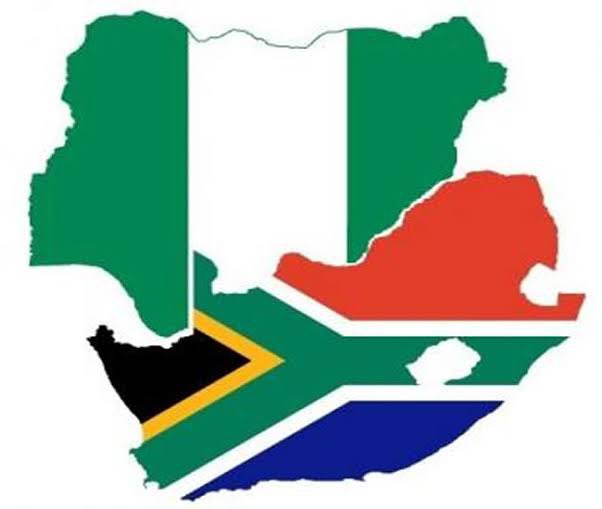Lagos — Without a last-minute diplomatic intervention, Nigeria’s youth basketball team would have missed an international competition in South Africa last month.
Nigerian officials claimed South Africa had tried to stop the under-18 team from participating – the latest row in long-simmering tensions between the two African economic heavyweights.
Recently the discord has spilled over into sports, music, ride-sharing apps and even beauty contests.
But Olawale Olusola, an international relations expert at the Obafemi Awolowo University in southwest Nigeria, explained that ties have been strained for decades.
Friction grew with the end of apartheid and South Africa’s first democratic elections in 1994, when Nigeria was still ruled by a military government.
In 1996, anti-apartheid hero and then-president of South Africa Nelson Mandela criticised the Nigerian authorities’ execution of writer and activist Ken Saro-Wiwa and eight others.
Nigeria’s military head of state General Sani Abacha retaliated by boycotting the African Cup of Nations in South Africa that year, sparking a tit-for-tat rivalry still simmering today.
‘Low ebb’
“Nigeria-South Africa relations have been at a very low ebb,” Olusola told AFP.
In 2019, a wave of violence against Nigerians in South Africa added further strain. Mobs descended on foreign-owned stores, looting and destroying properties.
As a result, the Nigerian government repatriated hundreds of its citizens. Reprisal attacks in Nigeria saw South African businesses torched and looted.
Weeks later, during a state visit by then-president Muhammadu Buhari to mend relations, the two African giants signed an extensive cooperation agreement.
But it failed to put the rivalry to bed, as the basketball spat shows.
Permits and pranks
South Africa’s consulate in Nigeria initially denied the youth male team travel permits, without explanation.
It took the intervention of Nigeria’s foreign ministry to resolve the matter, giving the Junior D’Tigers just hours before their first game.
Ugo Udezue, who led the Nigerian side to South Africa, slammed what he called a “deliberate attempt” to stop the squad from playing.
South Africa’s Department of Home Affairs did not immediately respond to AFP’s request for comments.
But a South African sports analyst Matshelane Mamabolo said the initial denial may not have been deliberate but also could “easily have been gamesmanship as well”.
“There is no love lost between the two countries, particularly when it comes to sports,” Mamabolo told AFP.
The tensions between the two countries have even disrupted things like ride-sharing platforms.
In August, the Bolt platform halted “inter-country” requests between South Africa and Nigeria after people pranked drivers with false trip bookings.
Beauty contest gets ugly
In perhaps the best-known recent example of the tensions, Miss South Africa contestant Chidimma Adetshina pulled out of the pageant following vicious xenophobic attacks centering on her Nigerian heritage.
Adetshina would later win Miss Universe Nigeria, but has spoken of the lasting pain of the abuse.
South African cultural analyst Pitika Ntuli argued Adetshina was “caught in the crossfire” as some politicians sought to weaponise anti-foreigner sentiment.
‘Afrobeats v. Amapiano’
Adetshina initially had support from South Africa’s Grammy award-winning singer Tyla, who defended her against online bullying but rowed back after a barrage of attacks from South Africans.
Tyla would find herself at the centre of another rivalry between the two countries weeks later, this time over music.
Nigeria’s Afrobeats and South Africa’s Amapiano have become some of the most notable genres worldwide, with artists from both nations collaborating and embracing each other’s styles.
But online brawls over accolades like the Grammys often see fans arguing over who deserves the awards.
In September, Tyla won “Best Afrobeats” at the 2024 MTV Video Music Awards for her hit song “Water”, ahead of Nigeria’s Burna Boy, Ayra Starr and Tems.
“African music is so diverse, it is more than just Afrobeats,” Tyla said after receiving the award. “I represent Amapiano. I represent my culture.”
‘Negative competition’
In September, a former Nigerian foreign minister argued South Africa’s “negative competition” with Nigeria was thwarting the West African country’s advancement in international politics.
Bolaji Akinyemi suggested South Africa had sought to keep Nigeria out of the BRICS group of emerging economies to bolster its own hopes of a permanent seat on the UN Security Council.
“South Africa is determined to derail Nigeria,” Akinyemi told a local broadcaster.
Despite the rivalry, South Africa remains one of Nigeria’s biggest trade partners in Africa and a key importer of its crude oil.
Olusola argued both nations stand to gain if they can see beyond the rivalry.
“It’s important for these two countries to reinforce that moral, philosophical, ideological, Pan-African standpoint as a basis for inspiring new forms of collaboration,” he told AFP.
Follow African Insider on Facebook, Twitter and Instagram
Source: AFP
Picture: X/@ShehuSani
For more African news, visit Africaninsider.com


